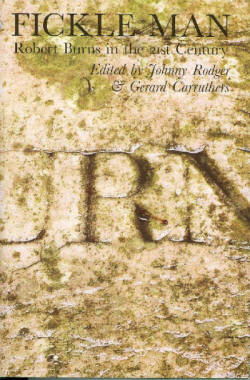|
Edited
by Frank R. Shaw, FSA Scot, Dawsonville, GA, USA
Email:
jurascot@earthlink.net
 Fickle
Man is a book any serious Burnsian,
scholar or layman should acquire. More importantly, it needs to be read,
maybe twice, it’s that good! I found it to be both challenging and
rewarding, and it will enlarge your Burns horizon. The book is edited by two
men who are imminently qualified in Burns scholarship, Johnny Rodger and
Gerard Carruthers. Rodger lectures at Glasgow School of Art and is co-editor
of The Drouth. Carruthers, noted international Burns scholar,
is Head of Scottish Literature at Glasgow University. In addition, they have
brought together some of the best minds in the world on the subject of
Robert Burns. Fickle
Man is a book any serious Burnsian,
scholar or layman should acquire. More importantly, it needs to be read,
maybe twice, it’s that good! I found it to be both challenging and
rewarding, and it will enlarge your Burns horizon. The book is edited by two
men who are imminently qualified in Burns scholarship, Johnny Rodger and
Gerard Carruthers. Rodger lectures at Glasgow School of Art and is co-editor
of The Drouth. Carruthers, noted international Burns scholar,
is Head of Scottish Literature at Glasgow University. In addition, they have
brought together some of the best minds in the world on the subject of
Robert Burns.
Right off
the bat the two authors say “…Burns is not a phony, he is a great artist and
as true a writer as any other. We celebrate here the 250th birth
anniversary of the poet by publishing a collection of essays of his life and
work.” Fickle Man is written by men and women who are not
afraid to unlock doors to new topics on Burns and neither are they afraid to
provoke “the Burns Police”, a term I picked up from popular Scottish singer
and Burns vocalist Eddi Reader. Who are the Burns Police? They are so
labeled because they insist on their way or no way when it comes to Burns.
This usually happens when the Burns pot is stirred with a hard question
about Burns or when a new view is espoused vis-à-vis the Bard. Burns Police
cannot tolerate their “ownership” of Burns being challenged. Neither do
they tolerate their beliefs concerning Burns being threatened.
Welcome to
a book of 18 articles that present a 21st century portrait of
Robert Burns! From beginning to end, Fickle Man is told with
today’s readers in mind. The essays follow in the solid tradition of other
Burns scholars I am familiar with who were not afraid to rock the boat when
it would have been easier not to have done so: Carol McGuirk’s
Critical Essays on Robert Burns (1998), Robert Crawford in
Robert Burns and Cultural Authority (1997), Kenneth Simpson’s
Burns Now (1994) and his Love and Liberty (1997), as
well as Donald Low in his Robert Burns: The Critical Heritage
(1974). I would be derelict if I did not mention G. Ross Roy’s
Studies in Scottish Literature (1998), Volume XXX, Robert Burns, the
bicentenary conference papers at the University of South Carolina. To me,
there was a common goal in mind - expressed or not - to demythologize Robert
Burns, but no one did a better job than Rodger and Carruthers with
Fickle Man.
Many of
the articles have appeared in “Scotland’s Only Literary Arts Quarterly”,
The Drouth, a periodical that should have your address label on
each new issue. The Drouth is on the cutting edge of Scottish
poetry and prose. The editors, Johnny Rodger and Mitchell Miller, usually
have an article on Burns in each edition. Look for a review of The
Drouth in an upcoming article on this site. I’m that impressed with
it!
As a
sidebar, if you do not know of Burns contemporary John Kay, you are in for a
real treat. His etchings of the very people Burns knew in Edinburgh are used
liberally throughout this publication. If it were not for Kay, there would
be no surviving portrait of the economist, Adam Smith. If you Google John
Kay, you will find that some of his satirical etchings were bought by his
subjects in order to destroy them! Kay was once prosecuted, unsuccessfully I
might add, and on another occasion someone took a cudgel to him. Evidently
he did not please everyone.
During a
recent visit to the Thomas Cooper Library at the University of South
Carolina, I was privileged to peruse two volumes of Kay’s works,
A
Series of Original Portraits and Caricature Etchings from 1872. I
would like to thank Dr. Patrick Scott for his able assistance at the library
and for providing me with further information since my visit on Kay from
The Oxford Dictionary of National Biography. “Kay etched in all
nearly 900 plates and drew almost every ‘notable Scotsman of his time, with
the exception of Burns’…” This is ironic since Kay worked in Edinburgh at
the time Burns was the toast of the city. Why is this? Some speculate that
politics played a part in Kay’s decision.
Fickle Man has too many topics to list all
of them here, but there is something for any serious student of Burns!
However, in Fickle Man you’ll find information on memorials,
movies, Ireland, slavery (you do not want to miss this one), education, the
laboring class poets, as a revolutionary, The Tree of Liberty, sex
(naturally), and fickle men. There is no way you can read this book and not
learn more about Burns as a man, stripped of mythology.
This book
is available at
www.sandstonepress.com. It can also be found on www.amazon.co.uk or may
be ordered from Waterstones. When all else fails, just Google Fickle
Man (ISBN: 978-1-905207-27-5). Cost £23.99 plus shipping and
handling. (FRS: 5.20.09) |

